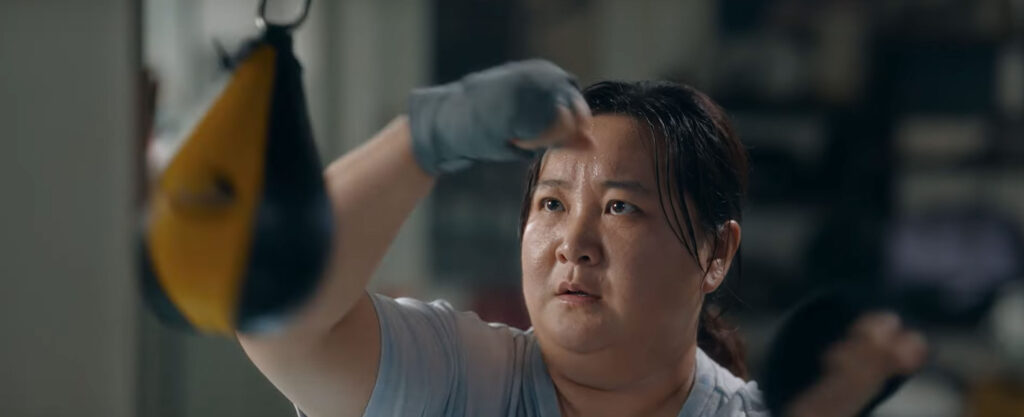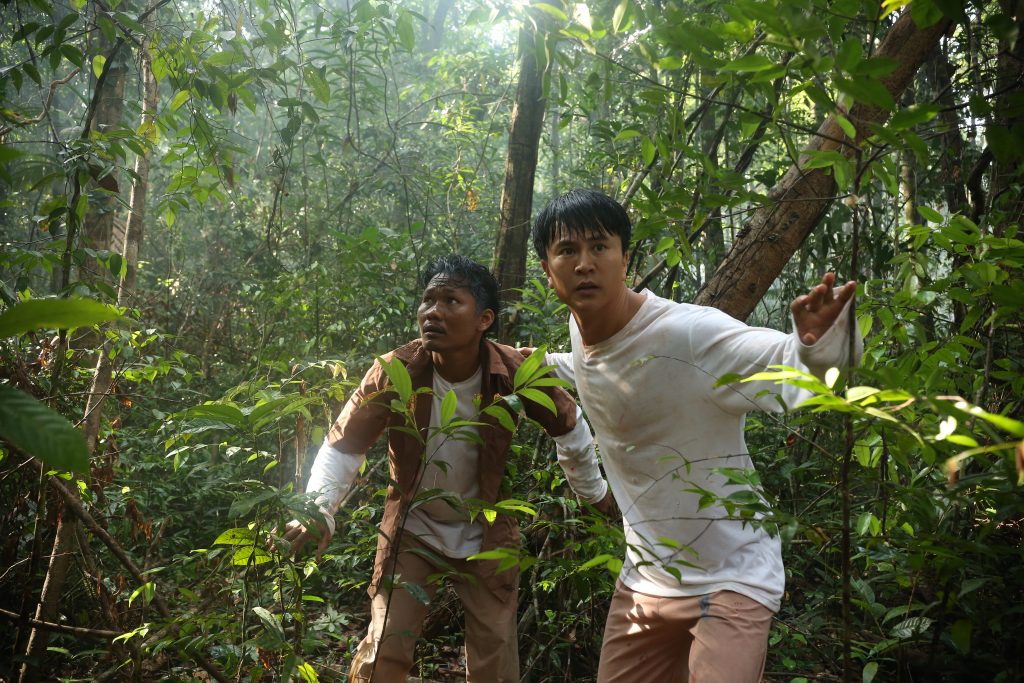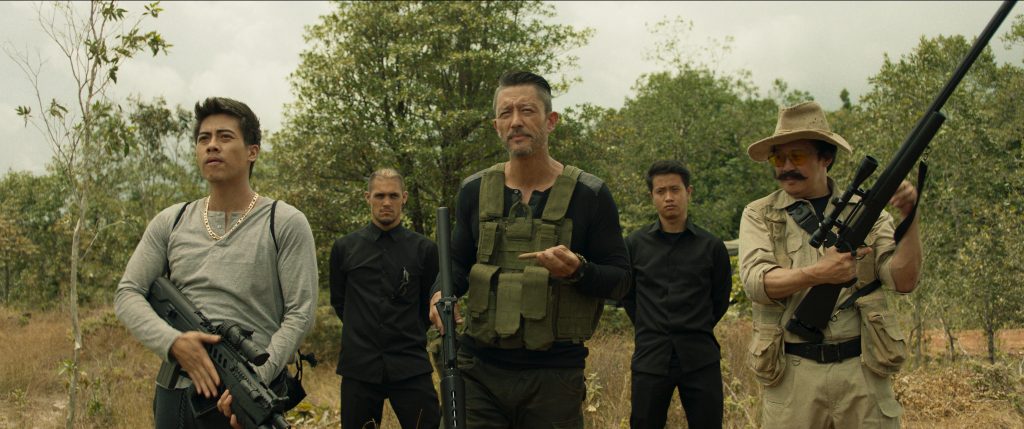March 8, 2024
by Carla Hay

Directed by Jia Ling
Mandarin with subtitles
Culture Representation: Taking place in Guangzhou, China, the comedy/drama film “YOLO” (based on the 2014 Japanese film “100 Yen Love”) features an all-Asian cast of characters representing the working-class and middle-class.
Culture Clash: A reclusive woman in her 30s gets close to a boxer who works at a gym, and she decides to train with him to become a boxer.
Culture Audience: “YOLO” will appeal primarily to people who are fans of Jia Ling, boxing movies, and stories about underestimated people who change their own lives for the better.

“YOLO” is undoubtedly inspired by the first “Rocky” movie, but this is no “Rocky” ripoff. The movie has some unexpected moments amid some predictability, along with heartfelt drama and a notable transformative performance from writer/director/star Jia Ling. The first third of the movie might be frustrating to watch because the protagonist is portrayed as pathetic, in a way that might appear to be almost insulting to this character. However, as “YOLO” progresses and the protagonist evolves, there are some twists and turns to the story that will take viewers on journey that becomes an emotional inspiration by the end of the movie.
“YOLO” (which is an acronym for “you only live once”) is based on the 2014 Japanese film “100 Yen Love.” “YOLO” (which takes place and was filmed in Guangzhou, China) starts off as mostly a comedy, but then it makes a credible transition to a more dramatic film as changes occur in the protagonist’s life. If the movie has any “feel good” moments, they are earned, because there’s a lot heartache and personal challenges along the way.
The opening scene of “YOLO” takes place right before a boxing match starts between two women at the Xiangjiang Boxing Club. The reigning champ is Liu Hongxia, while her challenger is revealed later when “YOLO” circles back to this scene in the last third of the film. The coach for the challenger can be heard off-camera saying about the boxing match: “Your rival is a pro. If it’s too hard, I’ll stop it.”
The next scene takes place in a convenience store, where store owner Mrs. Du (played by Zhao Haiyan) and her daughter Du Ledan (played by Zhang Xiaofei), who’s in her late 20s, work in the store. Mrs. Du (whose first name is not mentioned in the movie) and Ledan are showing a live surveillance video to Ledan’s distant cousin Doudou (played by Yang Zi), who is an aspiring TV producer/host. The surveillance video is showing Mrs. Du’s older daughter Du Leying (played by Jia), who is 32, as she is sleeping on a couch in the apartment that is located in the same building, behind the convenience store.
Mrs. Du explains with dismay and concern to Doudou that unemployed Leying typically lounges around and does a lot of sleeping during the day. Mrs. Du, her daughters, and Ledan’s daughter all live in the apartment. Ledan is a divorced mother of a daughter named Zhuzi, who’s about 3 or 4 years old. Mrs. Du and her husband Mr. Du (played by Zhang Qi) are separated, and he rarely communicates with his estranged wife and their children.
It’s later revealed that Leying has been chronically unemployed and living an aimless life for about 10 years, ever since Leying graduated from college and had problems keeping a job. Any casual observer can see that Leying is depressed. Leying says she can’t keep a job because she’s not good at communicating with people. Leying doesn’t say it out loud, but she is also self-conscious about her body size.
Meanwhile, Leying’s mother and sister are beginning to get fed up with Leying being unproductive. Doudou works as an intern for a reality TV show about giving chronically unemployed people a chance to turn their lives around. Doudou has been invited by Ledan to interview a reluctant Leying for an audition video for the show. Doudou sees this interview not only as a way to help Leying but also as a way to impress Doudou’s bosses at the TV show and hopefully be offered a permanent job on the show. Leying doesn’t do well during this interview, which frustrates her mother and sister even more.
Leying feels like a misfit and an outsider in her own home. Can her life get any worse? Yes. Leying has a boyfriend named Wei Dong Feng (played by Wei Xiang), who works as a delivery bike rider. Dong Feng has been secretly having an affair with Leying’s best friend Li Li (played by Li Xueqin), who is now pregnant. Li and Dong Feng also plan to get married in the near future.
Li and Leying have been friends since their childhood, when they were both bullied at school. Leying is invited to have lunch with Dong Feng and Li at a restaurant. Dong Feng breaks up with Leying during this lunch. Leying guesses correctly that another woman is the reason for the breakup. She grabs Dong Feng’s phone to find out who it is. And that’s how Leying discovers the truth that Li is “the other woman.” A devastated Leying also finds out about Li being pregnant and about the marriage plans.
On the night of this breakup, a very sad Leying walks around the city. One of the places she passes is a boxing gym. Through the gym window, she sees a man in his late 30s or early 40s who is practicing on a punching bag. Leying doesn’t know it yet, but his name is Hao Kun (played by Lei Jiayin), and he is a former professional boxer who gives boxing lessons at the gym. Leying and Ku will soon meet each other under some embarrassing circumstances.
Leying is unemployed but she isn’t completely broke. She has inherited an apartment from her grandmother that is worth an unnamed amount of money. There’s some jealousy that Leying’s mother and sister have about this inheritance, because Leying is the only one in the family who received this apartment as an inheritance. There’s also a hint of other family turmoil, because it’s mentioned at Mrs. Du is suing her sister for reasons that aren’t detailed in the movie.
Ledan asks Leying to transfer the apartment deed to Ledan, so that Ledan can sell the apartment and use some of the money to send Zhuzi to an elite private school. Leying says no to the request, and the two sisters get into an argument. Ledan’s pent-up resentment comes out at that moment, as she physically attacks Leying by punching Leying and tackling her to the ground. Leying doesn’t put up much of a fight, but this assault is the last straw for her.
Leying moves out of the apartment and finds another place to live. She needs to find a job to pay her rent. She becomes a server at a casual barbecue restaurant owned and managed by an unnamed man (played by Xu Jun Cong), who is very rude and condescending to Leying. It’s because of this restaurant job that Leying meets Kun.
One night, Leying is working at the restaurant, when a drunk customer gives Leying his car keys and asks her to get a pack of cigarettes from the glove compartment of his car, which he describes. The car is parked on a street right outside the restaurant. Leying gets in the car at around the same time that Kun is urinating on an outside wall of the gym, which is next door to the restaurant.
Leying sees Kun urinating and gets flustered. She accidentally turns on the car headlights, which shine directly on Kun. When she tries to turn the headlights off, she accidentally turns on the windshield wipers and the car blinkers. Even though no one else can can see what Kun is doing, he thinks Leying is trying to humiliate him for urinating outside in public.
Kun angrily goes over to the car to confront Leying, and she explains what she’s doing in the car. Kun advises her to ask the car owner what to do. He also tells Leying that he works at the gym and wouldn’t normally urinate in public, but the gym is closed, and he didn’t know where else to urinate.
After this tense conversation, Leying notices that Kun accidentally left his boxing gloves at the front of the building. She takes the gloves for safekeeping, and the next day, Leying goes to the gym to return the gloves to Kun. A female worker at the gym tries to persuade Leying to take boxing lessons at the gym, but Leying declines the offer.
Meanwhile, Kun is under pressure at his job to bring in more gym memberships. His boss tells Kun that Kun is underperforming in gym membership sales, and Kun could be at risk of getting fired. Kun just wants to do boxing at the gym and not be a salesperson. When Leying accidentally tags Kun on social media, he asks her out on a date, with the ulterior motive to try to sell her a gym membership. And so begins the unlikely relationship between Kun and Leying.
Although the trailer for “YOLO” shows Kun training to become a boxer, most of that doesn’t happen until the last third of the movie. The middle of the movie is about Kun training to make a comeback as a boxer. Things get a little complicated when Kun and Leying become sexually intimate, and there’s some uncertainty about how much of a romance they want to have in their relationship.
“YOLO” isn’t a typical boxing movie because it has many issues that are not in most boxing films. Leying is often body shamed because of her weight, which usually has harsher consequences for women than it does for men. For most boxing films, the boxers are not fat when they begin training.
There’s also a turning point for Leying’s self-esteem after she reacts in a certain way to sexual harassment from her boss. And then there’s the matter of Leying being sexually involved with her coach, which is something that is definitely not in most boxing movies. “YOLO” treats the consensual relationship between Leying and Kun with no judgment.
The relationship between Leying and Kun is not “only in a movie” cute. It’s messy, with both tension and warmth. Kun and Leying have arguments, but they are also supportive of each other. He can be very tough on her inside and outside the gym. And all that training results in Leying transforming physically as well as emotionally.
“YOLO” doesn’t shy away from any comparisons to “Rocky,” because there’s a training sequence that is a blatant homage to “Rocky,” including using Bill Conti’s “Gonna Fly Now” theme song from the movie. Are some moments in the move sentimentally earnest? Yes, but not in a way that’s overly cloying.
The heart and soul of “YOLO” is in Jia’s emotionally versatile and physically demanding performance—she gained and lost 50 kilograms (or 110 pounds) of body weight for this role—which is a testament to how it’s never to late for anyone to make improvements in life. Leying goes from someone who hides from life because she’s afraid of getting hurt to someone who finds the courage to live life to the fullest, no matter what the risks. “YOLO” might start out looking like a lightweight boxing comedy, but it ends up packing a powerful punch in the dramatic moments that show how having healthy self-confidence and inner peace are more valuable than external rewards.
Sony Pictures International released “YOLO” in select U.S. cinemas on March 8, 2024. The movie was released in China on February 10, 2024.


